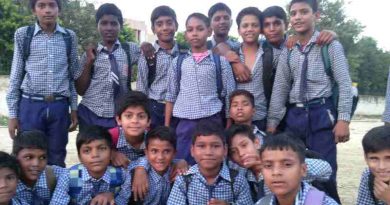Adam Braun Makes a Penciled Promise to Children
With a mission to provide education to underprivileged children, Pencils of Promise (PoP) – an organization that builds schools in the developing world – has partnered with two-time Grammy nominee Justin Bieber to launch Schools4All.org. It is a fundraising challenge that engages students, schools and parents to partake in solving the global education crisis.
Adam Braun, founder and executive director of Pencils of Promise, discusses the challenges in the current education system and PoP’s approach to help children, in an exclusive interview with Rakesh Raman, managing editor, Raman Media Network.
His answers to the crucial questions:
1. What are the current challenges in the global education ecosystem and how do you propose to overcome them?
There are many challenges in the global education ecosystem: from top-down systemic issues in how educational services are organized and delivered, to bottom-up issues of curriculum effectiveness, accountability, and human resource allocation.
This ecosystem is complex and very heterogeneous across regions and countries. So I can’t generalize all these problems in this medium. Specifically, in reference to the “global south,” some of the recurring themes that crop up are lack of access in terms of both infrastructure and programming, marginalization of females, and inadequate standards and teaching methods.
[ Also Visit: RMN Kids – Edutainment Site for Children ]At this phase in our organization’s evolution, our impact is focused almost exclusively on solving one issue: access. There are 75 million children in the world who lack access to even a basic pre-school education. We form three-way partnerships among local communities and local education ministries to bridge the educational infrastructure gap.
We look for places where a community is eager to empower the children through education and where local education ministry is willing to provide teachers. But there are not enough resources to provide an adequate facility. Our involvement serves as a catalyst in this three-way partnership for delivering access.
2. While there are already a huge number of educational institutions producing millions of literates in the developing world, the unemployment rate has always been increasing. How is this education useful if it can’t give you employment?
Global poverty is a complex web of interlinked problems. There is no one “silver bullet” that will solve global inequality. Multiple contributing factors must be tackled in parallel. Yes, education alone is unlikely to lead to employment without economic reform to address the demand side in much of the developing world.
However, the benefits of early childhood education transcend even economic considerations and address fundamental issues of quality of life.
We focus primarily on pre-school and primary education. There is an overwhelming wealth of research supporting the benefits of early education in tackling issues such as infant mortality rates, HIV/AIDS transmission, per capita income, and so on. The list goes on of metrics that are positively influenced by early education.
3. Can you suggest a new education system to produce employable people, as most traditional methods particularly in the developing countries have lost their relevance in the modern world?
This is a question beyond our scope of focus. We focus on creating access to education from the bottom up, by working with communities who are committed to empowering their children. We are not involved in top-down education reform.
4. What are the objectives and targets of your organization – Pencils of Promise (PoP) – to set up schools in the developing world?
Our goal is to build over 100 sustainable schools by the end of 2012. At that point, we will look to identify areas of programming that allow us to create an even deeper impact within our footprint.
5. Can we have some operational model to have self-sustaining schools, which are not dependent on external donations?
At the end of the day, it is the local community that needs to own the commitment to education. We feel that the model we have developed is a big stride towards self-sustaining schools. We are very careful to work with communities that have demonstrated a long-term commitment to empowering their children — those who want a “hand up” not a “hand out.”
We form a “Promise Committee” of village leaders who serve as our interface with the entire community. They sign a “Promise” contract, which spells out expectations of all parties for the ongoing sustainment of the project. We ask communities to contribute nearly 20% of the costs of the project, so that they truly have skin in the game, and have a sense of ownership.
After the school is built, we offer support and maintain close contact with all of our communities. But the expectation is that the community itself owns the costs of the basic maintenance and operation of the school. It takes a village to raise a child.
6. As Justin Bieber is involved in PoP’s campaign to raise funds for setting up schools, what has been his exact role and how did it help to spread awareness about PoP’s activities?
Justin is a member of what we call the PoP Movement: a growing community of young leaders who believe in education for all. Justin has been an advocate for Pencils of Promise since its inception and, like the rest of the members of the PoP Movement, he supports our mission in several ways: by contributing his time, his voice, and helping to raise funds.
Adam Braun (pictured above) is the founder and executive director of Pencils of Promise. As a college student traveling across the globe, Adam asked a small boy begging on the streets of India what he wanted most in the world. The answer: A pencil. The promise that came in handing out that first pencil led to the sharing of thousands while backpacking through over 50 countries, learning from locals about the need for a nonprofit that built schools based on a model of community empowerment. So, that is Pencils of Promise for you.
————————————————————————————————————————————————-
[ Also Read: What Ali Shadman of HP says while revealing the secrets of cloud computing. Full Interview ] [ Also Read: How a global human rights organization — Breakthrough — wants to leverage the pervasive reach of social games to see social change in the society. Interview with Mallika Dutt, founder and president of Breakthrough. Full Interview ] [ Also Read: Sara Bordo, president and co-founder of NowLive, believes we are already experiencing a major tech-led shakeout in the global markets. Full Interview ] [ Announcement: Thought Leaders Invited to Write for RMN News Site ]





